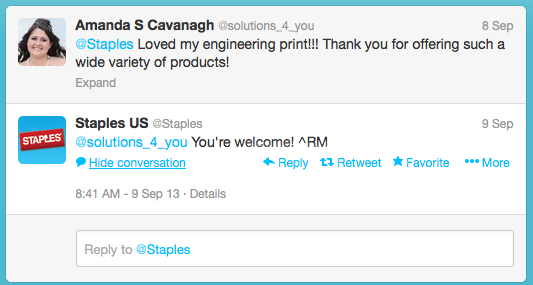 Before this week I thought that any measure of interaction was a measure of success. To some extent, I still do. However, I now know that there are a lot of other tools that I can use to define success in order to truly gauge how I am doing when it comes to social media.
Before this week I thought that any measure of interaction was a measure of success. To some extent, I still do. However, I now know that there are a lot of other tools that I can use to define success in order to truly gauge how I am doing when it comes to social media.
Peter Odryna talks about what the most important steps are for landing a client with social media research. One of the concepts that truly stayed with me is the idea of watching trends. I know that Twitter and other social media platforms will let you know what is trending, but I haven’t always known what to do with it. Now though I realize that you can use trends in two ways, one is to be able to jump in on the conversation and the other is to watch what is going on so you can monitor what is important to people and be able to do more research to know as much as you can about an important topic.
Why does keeping up with trends matter? Nils Mork Ulnes talks about how important analytics are when it comes to discovering what matters to potential customers and prospects in order to truly understand what they want to know about, hear about, and care about. When customers know that the businesses they are working with, it gives them a feeling of power and connection that not only has them connect back to the company, but excites them to share as well.
I was so excited when Staples replied to me about a product I bought! I not only shared this with some other social media students, I talked about it in my own personal life as well. I shared it on Facebook and showed people what I bought, it was a really nice experience to have a company take notice of what I said and respond. I had reached out to a few other companies and had received nothing as a response, so this made a big impact with me. That is one of the reasons I believe paying attention to what is trending with people and potential customers is so important. Everyone has something to say and wants to feel as though their thoughts matter, just acknowledging them can have such a meaningful impact on who they decide to work with in the future.
So how do you use social media metrics to define and measure success? There are a lot of ways that you can look at different pieces of your own social media influence. Ian Cleary talks about 7 different ways to track links some are free, while others you need a membership to use. The only one that I have any kind of knowledge about is bit.ly. With bit.ly you can shorten extremely lengthy links so that you can fit them in your tweets. However, since you can also use bit.ly to see where your links were shared it makes sense to use them even when you don’t need to shorten the link for a character limit. This is one great way to determine how often your link is being shared and one which platform you are connecting the most on. This is a great way to monitor how you are doing and on which platforms you can use to engage more and which platforms you need to tweak your methods to get better engagement.
One thing I always like to keep in mind is that even though I am focusing on using social media, each platform is different. Something that works well on Twitter might need more of an in depth explanation on Facebook or Google+. Also, even though visuals should be used for better engagement on all platforms, what is posted on Instagram doesn’t always work with what is posted on Pinterest even though they are both visual platforms.
Another way to keep track of what is working and what isn’t is by using Klout. Ian Barker talks about how Klout measures influence across every platform that you link to it. It gives you a score from 1-100 that will vary depending on your current activity and engagement from other people. I do like Klout, but I recognize that it is only one measurement of influence. There are a lot and as I grow I know that I will have to use various tools in order to measure my own success.
So how do you measure your success? What tools do you use to track engagement?
Do you connect with followers differently on different platforms or do you use the same posts and information on every platform?

Amanda, I only recently signed up for a Hootsuite account but I have been using bit.ly as a link shortener/tracker. I haven’t really felt like it’s been too difficult to track my engagement up to this point because I’m really just posting for class. I measure my success based on the quality conversations I’m able to strike up. Sometimes, success to me is a favorite or a mention by the brand I just wrote about in my blog.
I tend to change my posts a little bit between platforms. I definitely connect differently depending on the platform. I like to post most of my questions on in a Google+ Community. In doing so, I get great feedback and engagement. On Twitter, I usually post my blog links and retweet information from others. On Facebook, I tend to post my new blogs and any interesting information I come across and I like to use the class group for questions. I will also post my blogs to LinkedIn and an occasional question in one of my groups.
Hi Erin,
Thank you so much for commenting! I think that is a great strategy when it comes to what you are posting where. I do think it takes a lot of work though to stay on top of everything and consistently post. I agree that sometimes success can be measured in something small. For instance when I tweeted my midterm project, someone made it a “favorite”, and to me that is a win.
Amanda- When posting to various different social media sites I post similar content, but use a different tone depending on which site it is. I think it is important to have a consistent message across all channels, but each channel should not have the same verbiage and content.
Hi Casey,
Thank you so much for commenting! I think you make a great point. I used to want to post various but interesting things across my various platforms, but keeping a consistent message by using the same material but word-smithing it so that it is all different is a great idea, thank you!
I used to think of social media success as how many people you got to follow you, and in some regards that’s true, but now I know social media success is all about engagement. It’s about getting people who clicked on one of your social media sites, to come back and read more of your content. I use Klout to track my engagement. It’s nice to see what type of content is getting the most feedback, and what I need to work on.
Given the restrictions of certain platforms (Twitter only allowing 140 characters), sometimes I am forced to change up how I approach my content. If I share a longer narrative on Facebook, I’ll usually share a condensed link on Twitter.
Hi Lauren,
Thank you so much for commenting! I use Klout too! I find it a great way to see what works and what doesn’t as well. I am know also using the bit.ly links to track engagement as well. I find it interesting, because know I realize that my comment is being clicked on and being read, but just isn’t necessarily engaging people to comment enough.
Hi Amanda –
The only site I’ve signed up for it Klout. I haven’t used it that often, but I do love getting notifications that I’ve had a new “moment” or that my Klout score has increased. It’s a great confidence booster! Since I only have personal profiles and I am not working for any type of business’s social media department, I really measure success by the number of likes, comments, shares, or favorites that my posts get.
For a long time, I used my Twitter profile as an emotional outlet. I would post things on Twitter that I would never post on Facebook; mainly because my mother and family do not have Twitter accounts. If I was having a bad day and I just wanted to post something melancholy, I would go to Twitter since I really only followed celebrities and old friends from college. Now, I don’t see a lot of differences in my posts on Facebook and Twitter. I do use Twitter to “live Tweet” during awards shows or season finales – that type of thing I would never do on Facebook because I would hate to be “that” girl clogging up everyone’s newsfeed!
-Lacee
Hi Lacee,
I do love seeing that I have had a new moment on Klout too! I have noticed though that the higher my score gets, the easier it is to drop back down a point. Which makes me mindful of consistently keeping up with posting various things. I can totally understand about keeping things separate on Facebook and Twitter because of who follows you, I have caught my sister-in-law talking about things she shouldn’t on Facebook multiple times while she was venting on Facebook, I feel that it is a common problem. I am still working out what I will tweet, I just haven’t found the right fit as of yet. Thanks for commenting!
I try and tweak my content to each site on which I am posting. My tone on Twitter tends to be more fun and playful, Facebook more wordy and informative, etc. I keep the core content basically the same though.
As far as analytics, I am using Hootsuite and Sprout Social now, but I do feel like I need to step it up some. Is going to the pro version worth the money?
Hi Lesley,
Thank you so much for commenting. I think tweaking the content to suit each site is a great idea. As far as Hootsuite, I looked at this http://bit.ly/1arDF0d when I was debating between a paid profile or a free one, and while I am sticking to a free one for now, I really think there is some added value to considering the paid one. For instance, I don’t know how many social profiles you have, but being able to add more than 5 is great. Also, I think geo-targeting is a great idea since it may help gain clients. I am still learning how to use analytics, but being able to see Enhanced Analytics, Facebook Insights and Google Analytics in one place might really be useful. I hope that answers your question! Thank you so much for commenting.